|
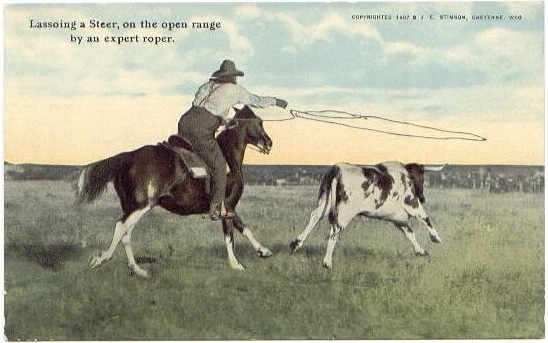
C. B. Irwin, 1906, photo by J. E. Stimson
Irwin's time was 38 1/5 seconds. The above photo is one of
Stimson's more noted photographs. The writer has observed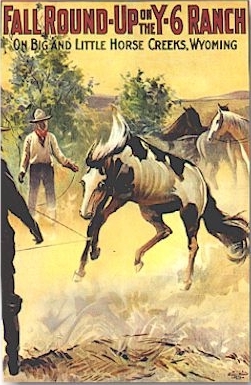 a copy of it on the wall
of a cowboy theme restaurant in Florida. In addition to promoting wild west shows, Irwin was
a lobbyist for the Union Pacific and
In 1909*, a little known cowboy who had previously appeared in Widerman's Wild West Show entered the calf-roping and
Bronco-busting contests. The cowboy drew a horse named Sabile. The cowboy's wife, Olive Stokes (Mrs. Tom) Mix was in the
stands. In the box next to her belonging to the plains hotel was the stock contracor for Frontier Days was Charles B. Irwin (1875-1934).
Mrs. Mix overheard Irwin's comment to no one in particular as to the cowboy then in the arena
that he would bet $500 that the cowboy would not last three jumps. Mrs. Mix took Irwin up on the bet. The hotel
manager held the funds. It was only later that Irwin learned that the young lady to whom he had lost was the
cowboy's wife. a copy of it on the wall
of a cowboy theme restaurant in Florida. In addition to promoting wild west shows, Irwin was
a lobbyist for the Union Pacific and
In 1909*, a little known cowboy who had previously appeared in Widerman's Wild West Show entered the calf-roping and
Bronco-busting contests. The cowboy drew a horse named Sabile. The cowboy's wife, Olive Stokes (Mrs. Tom) Mix was in the
stands. In the box next to her belonging to the plains hotel was the stock contracor for Frontier Days was Charles B. Irwin (1875-1934).
Mrs. Mix overheard Irwin's comment to no one in particular as to the cowboy then in the arena
that he would bet $500 that the cowboy would not last three jumps. Mrs. Mix took Irwin up on the bet. The hotel
manager held the funds. It was only later that Irwin learned that the young lady to whom he had lost was the
cowboy's wife.
[*Writer's note: The date and anecdote comes from Mrs. Mix's biography of her husband,
The Fabulous Tom Mix by Olive Mix with Eric Heath, Prentice Hall, Englewood Cliffs, 1957. The year may be in
error. The Plains Hotel did not open for another two years. Additionally, Mrs. Mix notes that
Charlie Tipton won several events. Tipton won the 1912 saddle bronc contest. Mrs. Mix also notes that she
stayed at the Plains and that another guest was Clayton "Banks" who had won the
saddle bronc contest the year before. Clayton Danks won in 1909.]
Irwin, himself, was the winner of the 1906 roping contest
and, today, is mainly remember with his brother FRank as the ones who sang Life is like a Mountain Railroad at Tom Horn's hanging.
Horn, himself, had entered the
1901 roping contest but did not progress to the finals. In 1911, Irwin as president of the Cheyenne Feature Film Co.
produced a movie apparently inspired by the life of Tom Horn,Round-Up on the Y-6 Ranch. The Y-6 was the
Irwin Brothers home ranch.
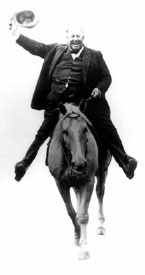
Above, Movie Poster, 1911. Right, C.B. Irwin. Photo by Ralph Doubleday.
The movie was filmed on the Y-6 as well as at Frontier Park and the Colorado State Prison in
Canon City, Colo.
On the ranch Irwin trained various animals for rodeos
including Frontier Days and race horses. Included in his stable was Steamboat which Irwin purchased from
John Coble. Others in the Irwin String many of whose pictures are later in this website, included
Teddy Roosevelt, Aeroplane, Silver City, Gin Fizz, Red Bird, Red Sandy and Woodrow Wilson. For his efforts as a stock contractor, Irwin was
inducted into the Pro-Rodeo Hall of Fame in 1979. The Y-6 Ranch, near Meriden, is still in business both as a working
ranch as well as catering to visitors. Irwin's soddie homestead is located near
Albin between Pine Bluffs and Lagrange.
Although today Irwin is given much of the credit for the early success of Frontier Days, in 1913 the Frontier Days committee and
the Irwin Brothers parted ways midst a fractious lawsuit. Eddie McCarty from Chugwater became one of the principal stock contractors for the
show. The Irwin Brothers for their own show, "Irwin Bros. Cheyenne Frontier Days Wild West Show" scheduled approximately a month and a half
before Frontier Days. The Association filed suit attempting to enjoin the use of the phrase "Cheyenne Frontier Days." The Irwins
retaliated by attempting to trademark the term "Cheyenne Frontier Days," followed by a full page advertisement in the State Leader:
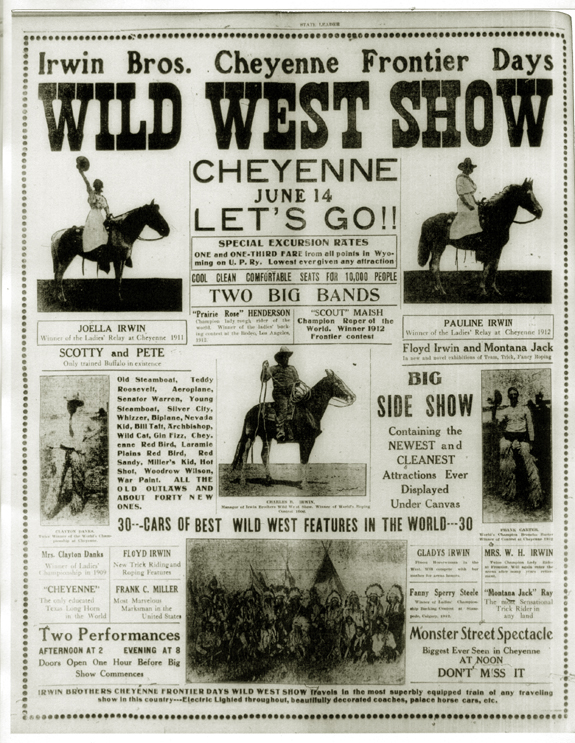
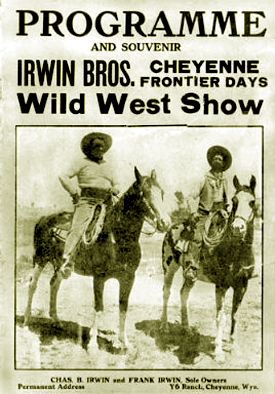
The shootout between th Irwins and the Frontier Days Association can best be described as a
draw. The Judge denied the injunction. The Irwins after a year were unable to obtain a trademark for the
phrase "Cheyenne Frontier Days. They continued to use it on their wagons and advertising.
The new show was a family affair featuring Charlie's two daughters, Joella Irwin, winner of the 1911 Ladies Relay,
and Pauline Irwin winner of the 1912 relay; Charlie's son, Floyd Irwin; and Gladys Irwin.
The show featured two bands, a calliope played by Clara (Mrs. Frank) Irwin, and the Irwins' two
trained bison Scotty and Pete. Rodeo performers who joined the show included
Clayton Danks; Praire Rose Henderson; and "Scout" Maish, Champion Roper of the World.
To attract other rodeo cowboys, the show had a 25-car train with electrically lighted palace cars.
The show itself slowly faded after three seasons. The show traveled through
Nebraska, down to Colorado, even as far as Canada. The 1914 season was marred when Frank Irwin was charged with a felonious assault on
Charles Johnson who had married Pauline Irwin. In 1916, the show travelled to California. In
1917 as discussed on a subsequent page, Floyd was killed while practicing for an upcoming Frontier Days show. With the death of his
son, Charlie's enthusiam waned. The Wild West Show equipment was stored at
at a baseball park north of town. Periodically, Charlie would loan the calliope to the Elks where it would
appear in occasional parades or accompany the Elks on excursions. But the steam was out of the
Calliope so to speak. In 1919 disaster struck. A fire broke out at the baseball park destroying the grandstands as well
as the Wild West Show equipment including stands, tents and the calliope. The equipment worth an estimated $70,000 was insured for only
$30,000. Charlie still put on the night show for Frontier Days. By 1922, Charlie Irwin's name appeared on the deliquent tax list. He still accompanied his daughter to
rodeos. Some remembered his big Buick. Others remembered his singing to himself the song
"Alfalfa Hay." Charlie went to work as a lobbyist for the Union Pacific. Later he developed in
California a string of race horses.
The six foot four inch Irwin developed a weight
problem. Mrs. Mix described Irwin as being "massive," Professor T. A. Larson in his
definitive History of Wyoming uses the term, "globular," and photographer J. E. Stimson in his caption to the
1906 postcard at the top of the page refered to Irwin as the "Giant Cowboy."
In March 1934, Irwin was running for Governor under a slogan suggested by his friend Will Rogers, "Popular government at popular prices."
At the time Irwin's weight has been
estimated to have been 400-450 lbs. He was heading into Cheyenne in the Old Buick driven by his son-in-law, Claude Sawyer. when
14 miles north of Cheyenne one of the front
tires blew out. The car rolled. Irwin did not survive the accident.
The Elks service conducted by Past Exalted Ruler Al Leslie was attended by 1300 mourners and concluded with the
singing of The Last Roundup:
I'm heading for the last roundup
Gonna saddle old Paint for the last time and ride
So long, old pal, it's time your tears were dried
I'm heading for the last roundup.
I'm heading for the last roundup
To the far away ranch of the Boss in the sky
Where the strays are counted and branded there go I
I'm heading for the last roundup.
[Chorus omitted]

Cowgirls in the Irwin Brothers Wild West Show, undated.
After Charlie's death, Will Rogers devoted the entirety of one of his weekly newspaper columns to Charlie. He recalled stopping in Cheyenne and
Charlie bringing him a box of fried chicken that Mrs. Irwin had prepared. He concluded the
column:
He was up to see me just before he was killed in the auto accident. Buddy Sterling who had charge of my horses was one
of Charley's main boys when he ran all the shows and contests. He was like Floyd, he was a top hand at anything. He gave ne a
race mare, a young one, that he wanted to have Buddy break for polo. Charley had a great career. He was a real cowpuncher in his day, and the
greatest spirit and best company that ever lived.
That other world up there is going to hear a whoop at the gate and a yell saying, "Saint Peter, open up that main gate, for there is a real
cowboy coming into the old home ranch. I am riding old "Steamboat" bareback and using "Teddy Roosevelt" for a pack horse. From now on this outfit is going
to be wild, for I never worked with a tame one."
At the time of Charlie Irwin's death, contemporaneous newspaper accounts indicated that Frank Irwin's whereabouts were
unknown. Frank ultimately moved to Colorado Springs where he died in Jamuary 1959.
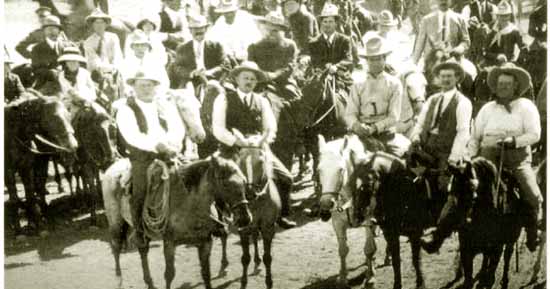
C. B. Irwin on right, 1909.
Next page, Frontier Days continued.
|